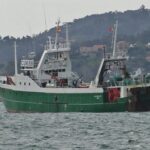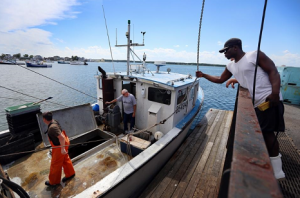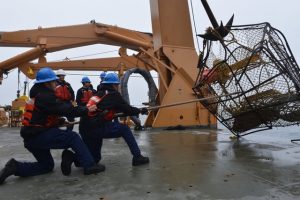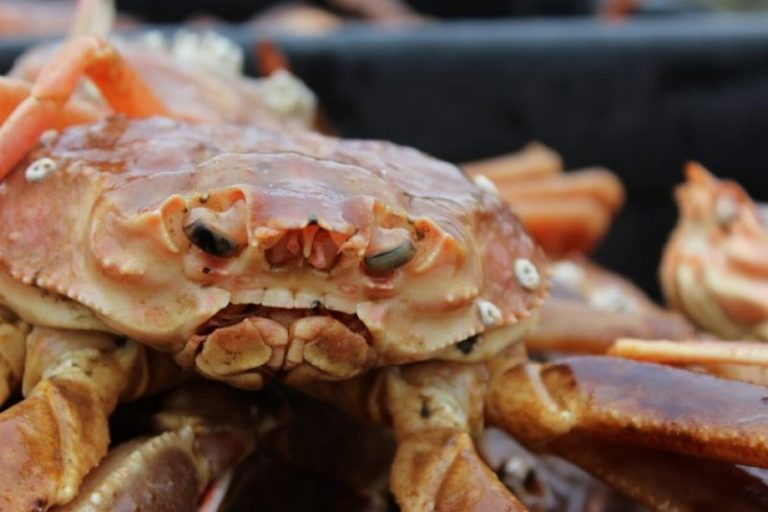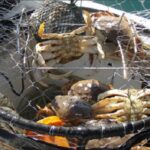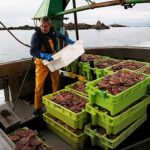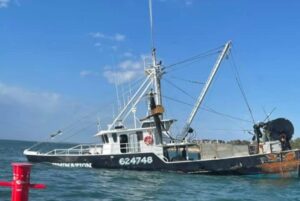Tag Archives: Ben Martens
Conservationists seek permanent marine protection for Cashes Ledge off Cape Ann
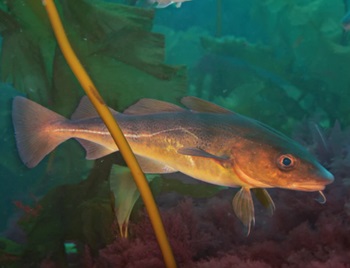 The Conservation Law Foundation, based in Boston, submitted a nomination to the National Oceanic and Atmospheric Administration (NOAA) today to designate Cashes Ledge as a sanctuary. National marine sanctuaries are permanently protected from fishing, shipping and ocean dumping and offer a haven for marine life and an undisturbed ecological site for scientific research. The nomination triggers a yearslong review process that could lead to the 766-square mile site being formally designated. The area is currently under fishing restrictions set by the New England Fisheries Management Council, but the conservation foundation said those limits are always subject to change and leave this habitat vulnerable. more, >>CLICK TO READ<< 08:05
The Conservation Law Foundation, based in Boston, submitted a nomination to the National Oceanic and Atmospheric Administration (NOAA) today to designate Cashes Ledge as a sanctuary. National marine sanctuaries are permanently protected from fishing, shipping and ocean dumping and offer a haven for marine life and an undisturbed ecological site for scientific research. The nomination triggers a yearslong review process that could lead to the 766-square mile site being formally designated. The area is currently under fishing restrictions set by the New England Fisheries Management Council, but the conservation foundation said those limits are always subject to change and leave this habitat vulnerable. more, >>CLICK TO READ<< 08:05
Fishermen Feeding Mainers awarded $750K in federal funds
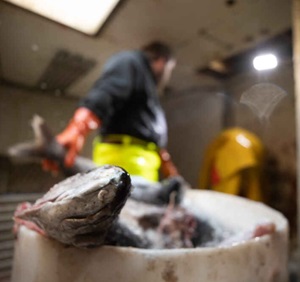 Fishermen Feeding Mainers, a program of the Maine Coast Fishermen’s Association, will be receiving $750,000 in federal funding thanks to an appropriations request submitted by Sen. Susan Collins (R-Maine) and Sen. Angus King (I-Maine). The successful request will provide funding for the program through Good Shepherd Food Bank of Maine. The Fishermen Feeding Mainers program began in October 2020 in response to the collapse of local markets and rising food insecurity in Maine. Initially funded by an anonymous foundation, the Maine Coast Fishermen’s Association partnered with Good Shepherd Food Bank to distribute donated fish to food pantries, meal sites and additional hunger-relief organizations located throughout the state. more, >>CLICK TO READ<< 06:25
Fishermen Feeding Mainers, a program of the Maine Coast Fishermen’s Association, will be receiving $750,000 in federal funding thanks to an appropriations request submitted by Sen. Susan Collins (R-Maine) and Sen. Angus King (I-Maine). The successful request will provide funding for the program through Good Shepherd Food Bank of Maine. The Fishermen Feeding Mainers program began in October 2020 in response to the collapse of local markets and rising food insecurity in Maine. Initially funded by an anonymous foundation, the Maine Coast Fishermen’s Association partnered with Good Shepherd Food Bank to distribute donated fish to food pantries, meal sites and additional hunger-relief organizations located throughout the state. more, >>CLICK TO READ<< 06:25
Maine Fishermen Caught More Fish in 2023, Thanks to a Hunger Relief Program and COVID Funds
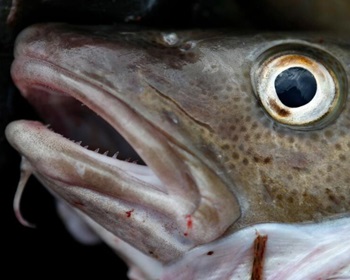 Maine fishermen bucked yearslong, industrywide trends last year and caught more fish, a development regulators and industry members said shows the impact of COVID-19 relief funds. The catch of haddock more than doubled to more than 500,000 pounds (226,796 kilograms), and the catches of Atlantic cod, witch flounder and Atlantic halibut were all up significantly. Federal money also supported the Fishermen Feeding Mainers program, which buys fish to support food banks and schools. Maine Coast Fishermen’s Association, an industry nonprofit group, launched the Fishermen Feeding Mainers program in part to help the groundfish industry survive the COVID-19 pandemic. more, >>click to read<< 15:23
Maine fishermen bucked yearslong, industrywide trends last year and caught more fish, a development regulators and industry members said shows the impact of COVID-19 relief funds. The catch of haddock more than doubled to more than 500,000 pounds (226,796 kilograms), and the catches of Atlantic cod, witch flounder and Atlantic halibut were all up significantly. Federal money also supported the Fishermen Feeding Mainers program, which buys fish to support food banks and schools. Maine Coast Fishermen’s Association, an industry nonprofit group, launched the Fishermen Feeding Mainers program in part to help the groundfish industry survive the COVID-19 pandemic. more, >>click to read<< 15:23
Coastal rebuilding in ‘limbo’ as residents await answers
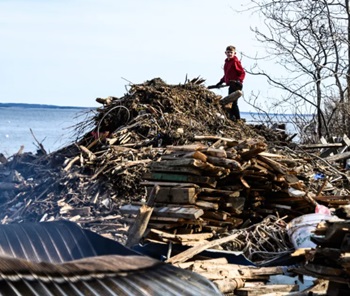 Bailey Island lobsterman and building contractor Guy Baker would like to rebuild the large wharf on his property that was torn to pieces in January’s coastal storms, but there are several unknowns. Nearly six weeks after back-to-back storms struck the Maine coast on Wednesday, Jan. 10, and Saturday, Jan. 13, the Harpswell resident still doesn’t know what sort of emergency funding he will receive, if any, to rebuild. He doesn’t know how long the town might give him to replace a generations-old structure that didn’t conform to current building codes. Baker doesn’t know what replacing the wharf would cost, or how long he’d have to wait for a specialty contractor to take on the job. He assumes prices have skyrocketed as property owners rush to repair millions of dollars’ worth of damage along the Maine coast. Baker isn’t alone. more, >>click to read<< 08:34
Bailey Island lobsterman and building contractor Guy Baker would like to rebuild the large wharf on his property that was torn to pieces in January’s coastal storms, but there are several unknowns. Nearly six weeks after back-to-back storms struck the Maine coast on Wednesday, Jan. 10, and Saturday, Jan. 13, the Harpswell resident still doesn’t know what sort of emergency funding he will receive, if any, to rebuild. He doesn’t know how long the town might give him to replace a generations-old structure that didn’t conform to current building codes. Baker doesn’t know what replacing the wharf would cost, or how long he’d have to wait for a specialty contractor to take on the job. He assumes prices have skyrocketed as property owners rush to repair millions of dollars’ worth of damage along the Maine coast. Baker isn’t alone. more, >>click to read<< 08:34
‘Working Waterfront Support Fund’ helping Maine fishermen impacted by recent storms
 It could be a while before Maine’s commercial fishing industry really sees the extent of the damage caused by the recent storms and flooding. Restoration efforts are underway now along the coast. The Maine Coast Fishermen’s Association is stepping in to help. They’ve established the “Working Waterfront Support Fund.” They’re encouraging Mainers to make a contribution to help in the reconstruction of the working waterfront. more, >>click to read<< 07:52
It could be a while before Maine’s commercial fishing industry really sees the extent of the damage caused by the recent storms and flooding. Restoration efforts are underway now along the coast. The Maine Coast Fishermen’s Association is stepping in to help. They’ve established the “Working Waterfront Support Fund.” They’re encouraging Mainers to make a contribution to help in the reconstruction of the working waterfront. more, >>click to read<< 07:52
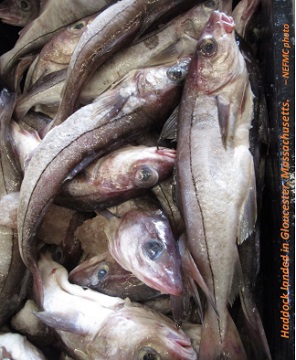
Haddock quotas for fishermen have been drastically cut. What does that mean for haddock eaters?
There is a haddock problem swimming around Gulf of Maine waters. But don’t blame the problem on fishermen catching too many haddock, say Maine commercial fishing advocates like Ben Martens, executive director of the Maine Coast Fishermen’s Association. In fact, they have been fishing in accordance with mandated quotas for decades, he said, regulatory measures that have returned the haddock stocks in the Gulf of Maine to sustainable levels. The problem, rather, is grounded in inaccurate accounting of the boom-and-bust cycles of haddock biomass, that is, how many fish are swimming in the Gulf of Maine at any given time. In April, the New England Fishery Management Council, a regional body that uses industry and scientific data to recommend quotas that restrict how many metric tons of regulated species Maine fishermen can haul in each year, announced a cut in haddock quotas. It represents an 80 percent reduction in allowable catch; the new season began on May 1. >click to read< 08:50
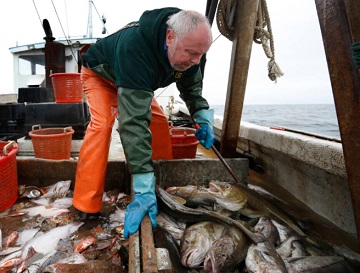
Mega Cut: Haddock, a staple Atlantic fish, is in decline off New England, regulators say
A recent scientific assessment found that the Gulf of Maine haddock stock declined unexpectedly, and that meant the catch quotas for the fish were unsustainably high, federal fishing managers said. “We seem to find plenty, but they can’t,” said Terry Alexander, a Maine-based fisher who targets haddock and other species. “It’s a disaster is what it is. A total, complete disaster.” The fishery management council mandated the 84% reduction in catch quotas for the current fishing year, which started May 1. The change applies to fishers who harvest haddock from the Gulf of Maine, a body of water off Massachusetts, New Hampshire and Maine. Fishers also harvest from Georges Bank, a fishing ground to the east where quotas were also reduced for this year, including adjoining areas overseen by Canadian officials who issued their own major cuts. >click to read< 08:02
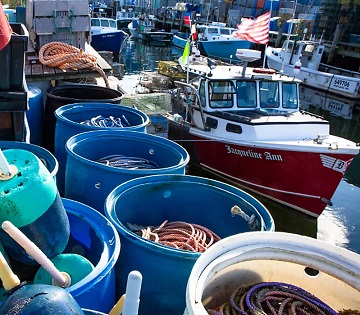
Maine’s seafood harvest has fallen 120M pounds since 2012
At 197 million pounds for all commercially harvested marine species, 2022 was the first time since 1975 that Maine’s reported annual seafood harvest has fallen short of 200 million pounds. In fact, the cumulative volume of Maine’s commercial fisheries dropped by more than 120 million pounds between 2012 and 2022, state data show. Patrick Keliher, head of the state’s Department of Marine Resources, said there are myriad reasons why fishery landings have declined — some regulatory, others environmental. Meanwhile, landings of lobster, which remains the state’s dominant fishery despite looming restrictions to better protect whales, have dipped in recent years but still are much higher than they were prior to the 1990s. >click to read< 09:12
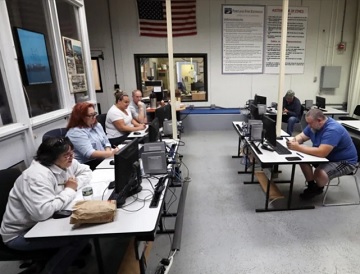
Portland Fish Exchange’s future murky as sales plummet
The future course of the Portland Fish Exchange is deeply uncertain but will likely be set this fall. The exchange, which was opened by the city in 1986, has provided nearly daily auctions of fish on the Portland Fish Pier. It was seen as a solid market-based alternative to the long-standing system that saw many fishermen turn their catch over to pier owners, who then trucked the fish out of state and tried to get a good price for them in markets elsewhere in New England or in New York. Last year, it hit rock bottom, with only 1.4 million pounds of fish auctioned. Some daily auctions were canceled because there simply wasn’t enough cod, haddock, flounder and halibut to attract commercial buyers. >click to read< 09:15
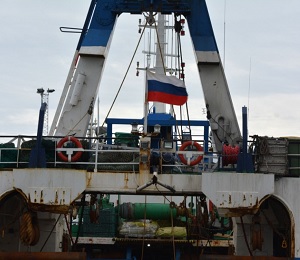
Seafood Biz Braces For Losses Of Jobs, Fish Due To Sanctions
The worldwide seafood industry is steeling itself for price hikes, supply disruptions and potential job losses as new rounds of economic sanctions on Russia make key species such as cod and crab harder to come by. The latest round of U.S. attempts to punish Russia for the invasion of Ukraine includes bans on imports of seafood, alcohol and diamonds. The impact is likely to be felt globally, as well as in places with working waterfronts. One of those is Maine, where more than $50 million in seafood products from Russia passed through Portland in 2021, according to federal statistics. “If you’re getting cod from Russia, it’s going to be a problem,” said Glen Libby, an owner of Port Clyde Fresh Catch, a seafood market in Tenants Harbor, Maine. “That’s quite a mess. We’ll see how it turns out.” >click to read< 13:39
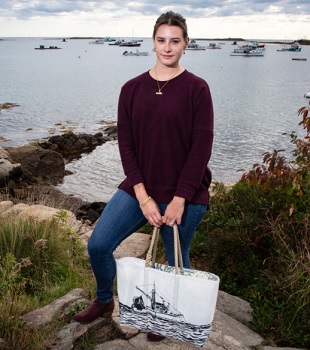
Daughter continues work of father lost at sea on Maine fishing boat
In January 2020, the 42-foot fishing boat Hayley Ann sank 50 miles southeast of Portland. The Coast Guard never determined what happened. No distress call was sent. Only an automated emergency beacon alerted them to the tragedy. The disaster claimed the lives of Capt. Arnold “Joe” Nickerson, 60, of Arundel and his crewman, 44-year-old Christopher Pinkham of Boothbay Harbor. >click to read< 15:58
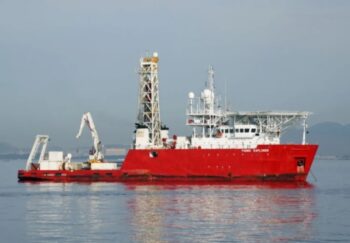
Undersea cable survey marks milestone in Maine’s offshore wind quest
Three marine vessels that study the makeup and geology of seabeds are scheduled to arrive in Maine over the next week or so to survey the proposed route of an underwater cable that will link a floating, offshore wind turbine near Monhegan Island,,, The project received a major boost last August when Diamond Offshore Wind, a subsidiary of Mitsubishi Corp., and RWE Renewables, the world’s second-largest offshore wind company,,, While the location of offshore wind turbines has gotten a lot of attention, the siting of the cables that connect turbines received less scrutiny, according to Annie Hawkins, of RODA, >click to read< 15:25
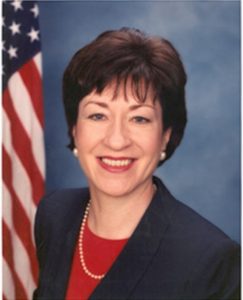
CARES Act : Maine’s cut of $300 million in federal seafood industry funding is nation’s fifth-highest.
Maine is in line to get $20 million to help its battered seafood industry weather the COVID-19 storm. The award, announced Thursday by U.S. Sen. Susan Collins, R-Maine, comes out of the $300 million in federal funding included in the CARES Act to help the U.S. fishing industry survive the economic losses associated with the coronavirus pandemic. Maine’s award was the fifth-highest out of 31 states. Commissioner Patrick Keliher said Thursday that he was only just learning about the award and would not be making any comments about distribution plans, , or priorities, until he received specific guidance from the NOAA. >click to read< 13:44
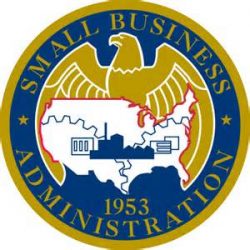
Coronavirus: Maine fishermen say they missed out on pandemic relief program
Thousands of Maine fishermen and others in the seafood sector could have qualified for pandemic relief through the Paycheck Protection Program, but many were, apparently, unable to access the benefits before the money ran out. Ben Martens, executive director of the Maine Coast Fishermen’s Association, said many of the industry’s on-the-water workers did not realize they were likely to qualify for the forgivable loans and other assistance that was briefly made available through the Small Business Administration. >click to read< 15:11
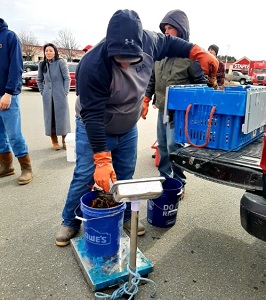
Hustle and Innovation: Maine fishermen turn to direct-to-consumer outlets
Fishermen and seafood farmers are struggling with markets that have recently slammed shut. But over the past week, at least a few outlets have been established to connect the businesses directly to consumers. A new Facebook group called Maine’s Working Waterfront-Seafood Connect began offering consumers the chance to pre-order lobster, oysters and other seafood. Two pick-ups have been held in Rockland. >click to read< 06:40
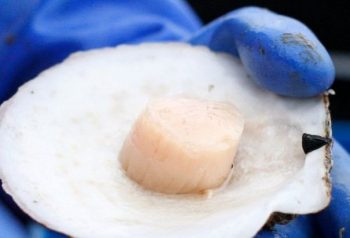
America’s got scallops: Catch is up, consumers shelling out
America’s harvest of scallops is increasing to near-record levels at a time when the shellfish are in high demand and the value of the fishery has surged in recent years. Sea scallops, harvested mostly by boats from the cold Atlantic Ocean, are the target of one of the most valuable fisheries in America. New data from the National Oceanic and Atmospheric Administration says the harvest topped 58.2 million pounds last year, the highest total since 2011 and the fifth-highest in history according to federal statistics going back to 1945. >click to read< 15:30
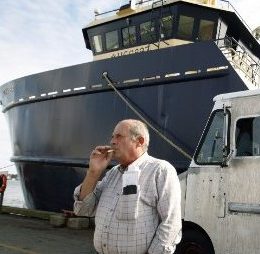
What’s fair in breaking up the empire of ‘the Codfather’?
Randy Cushman, a fourth generation fisherman in Maine, knows what the crimes of Carlos Rafael cost him.,,, Rafael, whose downfall came after he boasted of his scheme to undercover IRS agents posing as Russian mobsters, is now serving a 46-month sentence in federal prison.,,, Senator Elizabeth Warren fired off a letter in August warning of “needless, immense damage” if permits leave New Bedford. Governor Charlie Baker asked that the permits at least stay in Massachusetts. click here to read the story 07:16
For fisheries regulations, a Trump edict signals uncertainty
 New England fishermen and conservationists fear one of President Trump’s executive orders will have disruptive effects on fisheries management, although it will not affect routine seasonal fisheries regulation, as some had initially feared. The order prompted a fiery letter three days later from two prominent Democratic congressmen pointing out it could have “devastating impacts on commercial and recreational fisheries and the businesses and communities they support.” “Effectively what it means is that nobody can do anything because agencies will have to stop doing major regulatory actions because you can’t comply with this order, which may be the point,” says a former top federal fisheries management official, Andrew Rosenberg, who is now director of the Center for Science and Democracy at the Union of Concerned Scientists. Drew Minkiewicz, a Washington, D.C., lawyer representing larger Eastern Seaboard scallop fishermen, says fishermen need not be concerned about most regulations. “This executive order has zero impact on 99.9 percent of the fishing regulations going out, so people who are wondering if the fishing season will be delayed don’t need to,” he says. “It’s much ado about nothing.” Read the article here 08:39
New England fishermen and conservationists fear one of President Trump’s executive orders will have disruptive effects on fisheries management, although it will not affect routine seasonal fisheries regulation, as some had initially feared. The order prompted a fiery letter three days later from two prominent Democratic congressmen pointing out it could have “devastating impacts on commercial and recreational fisheries and the businesses and communities they support.” “Effectively what it means is that nobody can do anything because agencies will have to stop doing major regulatory actions because you can’t comply with this order, which may be the point,” says a former top federal fisheries management official, Andrew Rosenberg, who is now director of the Center for Science and Democracy at the Union of Concerned Scientists. Drew Minkiewicz, a Washington, D.C., lawyer representing larger Eastern Seaboard scallop fishermen, says fishermen need not be concerned about most regulations. “This executive order has zero impact on 99.9 percent of the fishing regulations going out, so people who are wondering if the fishing season will be delayed don’t need to,” he says. “It’s much ado about nothing.” Read the article here 08:39
Pew Charitable Trusts promoting illegal fishing crackdown
 In New England, one of the U.S.’s most active fishing areas, between 12 and 24 percent of the total catch of species such as cod, flounder and haddock was taken illegal in 2010, according to a study in the journal Marine Policy. Ben Martens, executive director of the Maine Coast Fishermen’s Association, said Pew’s project could potentially be a “way to use technology to try and deal with an issue that we have been having a hard time figuring out.” WTF? photo credit Read the rest here 11:44
In New England, one of the U.S.’s most active fishing areas, between 12 and 24 percent of the total catch of species such as cod, flounder and haddock was taken illegal in 2010, according to a study in the journal Marine Policy. Ben Martens, executive director of the Maine Coast Fishermen’s Association, said Pew’s project could potentially be a “way to use technology to try and deal with an issue that we have been having a hard time figuring out.” WTF? photo credit Read the rest here 11:44
The Waning of Political Power for Fishermen? by Ben Martens
There is a long and storied history of great supporters of fisheries and the fishing industry in Congress. The late Senator Warren Magnuson of Washington was a lover of the marine environment and helped pen the Marine Mammal Protection Act in order to protect the Orca whales of Puget Sound. Additionally,,,,,,,,Read more



































